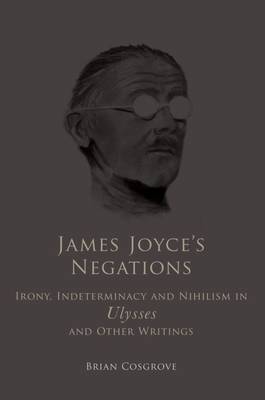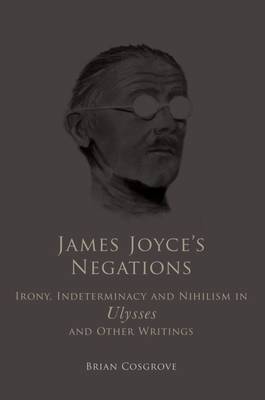
- Retrait gratuit dans votre magasin Club
- 7.000.000 titres dans notre catalogue
- Payer en toute sécurité
- Toujours un magasin près de chez vous
- Retrait gratuit dans votre magasin Club
- 7.000.0000 titres dans notre catalogue
- Payer en toute sécurité
- Toujours un magasin près de chez vous
James Joyce's Negations
Irony, Indeterminacy and Nihilism in Ulysses and Otherwritings
Brian Cosgrove
Livre relié | Anglais
86,45 €
+ 172 points
Description
The main purpose of this book is to validate a reading of Joyce in negative terms. Central to the enquiry is an examination of the roles of irony and of indeterminacy. Irony, interpreted in metaphysical rather than merely rhetorical terms, is envisaged as deriving from two separate if related orientations, one associated with Friedrich Schlegel, the other with Gustave Flaubert. Insofar as Joyce's work (including "Ulysses") owes more to the latter than the former, it forgoes the genial humour central to Schlegel's theories, and embraces instead the ironic detachment and formal control of a Flaubertian perspective. Such irony (which entails a suspicion of sentiment and a related dehumanisation of character, as in some of the stories in Dubliners) becomes normative in Joyce, and along with a similarly deflationary parody pervades "Ulysses". In addition, a persistent indeterminacy is established as early as 'The Dead', so that it becomes impossible in that story to adjudicate between not just contradictory but mutually exclusive interpretations. Such indeterminacy is pushed to further extremes in "Ulysses", with its notorious proliferation of narrative perspectives.As a corollary to the work's encyclopaedic inclusiveness and quotidian particularism, every detail tends to assume the same significance as every other; the consequence being that (in Gyorgy Lukacs' famous formulation) we lose all sense of any 'hierarchy of meaning'. From that it is but a step to Franco Moretti's assessment that in "Ulysses" everyday existence remains 'inert, opaque - meaningless', and that in fact the whole point is to represent the meaningless precisely 'as meaningless'. Indeterminacy, in effect, ushers in the possibility of nihilism. The analysis of "Ulysses" culminates with the attempt (unavailing in both cases) to discover in either Bloom or Molly a genuine source of countervailing affirmation. The study concludes with a brief consideration of the polysemic vocabulary of "Finnegans Wake" as a logical extrapolation of the poetics of indeterminacy.
Spécifications
Parties prenantes
- Auteur(s) :
- Editeur:
Contenu
- Nombre de pages :
- 272
- Langue:
- Anglais
Caractéristiques
- EAN:
- 9781904558859
- Date de parution :
- 08-10-07
- Format:
- Livre relié
- Format numérique:
- Genaaid
- Dimensions :
- 159 mm x 238 mm
- Poids :
- 603 g

Les avis
Nous publions uniquement les avis qui respectent les conditions requises. Consultez nos conditions pour les avis.






